eSkill is an online pre-employment testing and skills assessment platform that is commonly used by employers and HR professionals for candidate screening and evaluation. It is designed to help organizations assess job applicants’ skills and knowledge, ensuring that they have the qualifications necessary for a particular role.
Here are some key features and aspects of eSkill:
Customizable Assessments: eSkill allows employers to create customized assessments tailored to the specific requirements of the job position. These assessments can cover a wide range of topics and skills, including technical skills, cognitive abilities, language proficiency, and more.
Extensive Test Library: The platform offers a vast library of pre-built tests and questions across various industries and job functions. This library can be a valuable resource for employers looking to quickly assess candidates for common roles.
Realistic Simulations: eSkill provides realistic simulations and interactive assessments that mimic actual job tasks. This allows employers to evaluate how well candidates can perform job-related activities.
Remote Testing: Candidates can take eSkill assessments remotely, making it a flexible and accessible tool for both employers and job seekers.
Instant Results: Employers receive instant, detailed reports on candidates’ performance, allowing for quick and data-driven hiring decisions.
Just so you know
With OnlineExamMaker quiz software, anyone can create & share professional online assessments easily.
What are the limitations of eSkill?
While eSkill and similar pre-employment testing platforms offer numerous benefits in the hiring process, they also come with certain limitations that employers should be aware of:
Limited Assessment Scope: eSkill primarily focuses on assessing candidates’ skills and knowledge through tests and simulations. It may not effectively evaluate soft skills, interpersonal abilities, or cultural fit, which are also essential for many roles.
Potential for Cheating: When assessments are taken remotely, there’s a risk of candidates using external resources or getting help from others, which can compromise the integrity of the test results.
Time-Consuming: Creating customized assessments can be time-consuming, especially for roles with unique requirements. Employers need to invest time and effort in test development.
Costs: While eSkill can be cost-effective for assessing a large number of candidates, there are associated subscription or usage fees. Smaller organizations with limited budgets may find it less affordable.
Overemphasis on Test Scores: Relying solely on test scores to make hiring decisions can overlook other factors that contribute to a candidate’s suitability for a role, such as experience, work ethic, and adaptability.
Potential for Bias: Care must be taken to ensure that assessments are not biased or discriminatory, as this can lead to legal issues and unfair hiring practices.
Candidate Experience: Some candidates may find the testing process stressful or intimidating, potentially affecting their overall experience with the hiring process and the perception of the company.
Lack of Context: Test scores alone may not provide the full context of a candidate’s skills or abilities. It’s essential to complement test results with interviews and reference checks.
Looking for online assessment software similar with eSkill? Here are the top six eSkill alternative software for you.
1. OnlineExamMaker
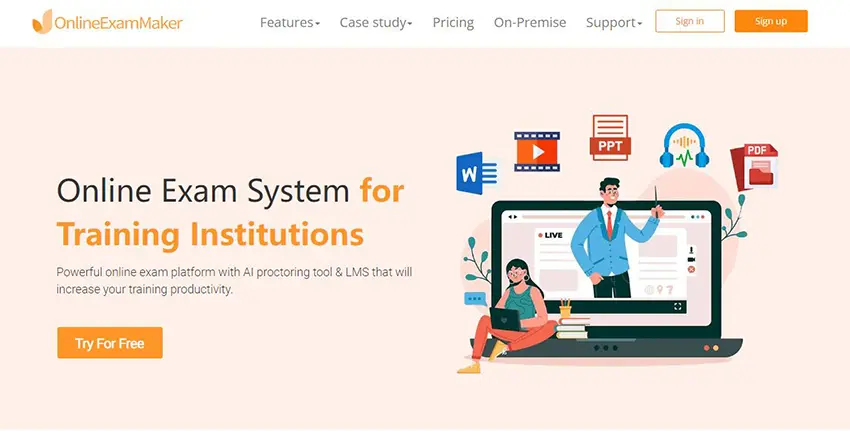
OnlineExamMaker is a powerful and user-friendly software tool that allows educators, trainers, and businesses to create interactive online quizzes and assessments. It offers a wide range of online quizzes and assessments to evaluate students, staffs, and learners.
OnlineExamMaker is cloud-baed and mobile friendly, the created exams can be access on various devices, including desktop computers, laptops, smartphones, and tablets, allowing you to test your connection speed anytime, anywhere. You can personalize your quizzes by adding your branding elements such as logos, colors, and custom backgrounds.
Pros:
Share to Social: Share your online exam with audiences on social platforms like Facebook, Twitter, Reddit and more.
Quiz on Mobile: Take an online exam on any devices, including mobile phone, tablet, laptop, desktop. Support users to scran a QR code to enter the online exam.
AI proctoring technology: Our patented proctoring solution observes behavior and detects any anomaly with face and emotion recognition, gaze and voice detection, tab changes, secondary screen and many more
Group Testing: Easily assign the created exam to a group containing multiple candidates to assess particular learners directly.
Cons:
New users need spend time to learn to some advanced features, such as AI proctoring setting.
Create Your Next Quiz/Exam with OnlineExamMaker
2. Vervoe
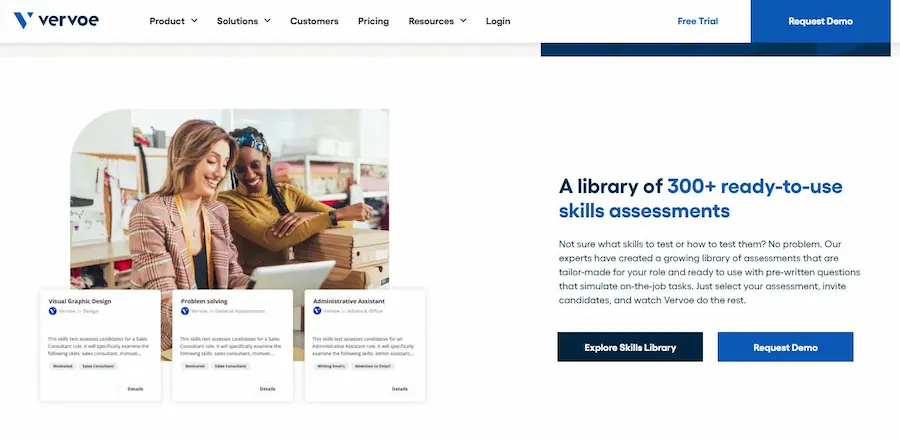
Vervoe is a comprehensive skill assessment platform that enables employers to evaluate candidates across various roles and industries. It goes beyond traditional multiple-choice tests, offering candidates the opportunity to demonstrate their skills through real-world tasks and simulations. Employers can create customized assessments or choose from a library of pre-built assessments. Vervoe’s AI-driven platform evaluates candidate responses and provides detailed insights to make informed hiring decisions. It’s a valuable tool for organizations looking to identify the most qualified candidates based on practical skills and abilities.
Pros:
Real-World Simulations: Vervoe allows candidates to showcase their skills through real-world tasks and simulations, providing a more accurate assessment of their abilities.
AI-Driven Insights: The platform’s AI analyzes candidate responses and provides valuable insights, helping employers make data-driven hiring decisions.
Customizable Assessments: Employers can create tailored assessments to match specific job requirements.
Cons:
Focused on Practical Skills: While Vervoe excels at assessing practical skills, it may not be as effective for evaluating soft skills or personality traits.
3. Codility

Codility is a skills assessment platform tailored to tech recruiters and hiring managers. It specializes in evaluating candidates’ coding and programming skills through a library of coding tasks and challenges. Codility’s platform assesses candidates’ code quality, performance, and correctness, helping employers identify top programmers. With features like live coding interviews and real-world project assessments, Codility streamlines the tech hiring process by ensuring that candidates have the coding skills required for the job.
Pros:
Coding Proficiency Assessment: Codility focuses exclusively on assessing coding skills, making it a specialized tool for tech recruiters.
Live Coding Interviews: Offers live coding interviews and real-world project assessments for in-depth evaluations.
Customizable Tests: Employers can create customized coding tests to match specific job requirements.
Cons:
Limited Scope: Codility is primarily designed for tech roles, limiting its applicability to non-technical positions.
Complexity: Some employers may find the platform’s features and interface complex to navigate.
4. Criteria
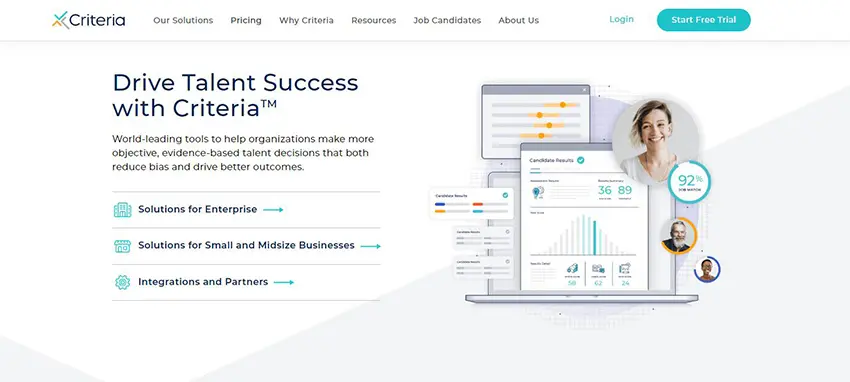
Criteria is a comprehensive pre-employment testing platform that offers a wide range of assessments, including cognitive aptitude tests, personality assessments, and skills assessments. It caters to a variety of industries and job roles, providing customizable assessments to evaluate candidates effectively. Criteria’s assessments are designed to predict job performance and cultural fit, helping employers make data-driven hiring decisions. It’s a versatile tool for organizations seeking a holistic approach to candidate evaluation.
Pros:
Diverse Assessments: Criteria offers a wide range of assessments, including cognitive aptitude, personality, and skills assessments, suitable for various industries.
Predictive of Job Performance: Assessments are designed to predict job performance and cultural fit, aiding in effective candidate selection.
Customization: Employers can customize assessments to meet specific job criteria.
Cons:
Cost: Pricing may be a limitation for smaller organizations with budget constraints.
Complexity: Managing a variety of assessments can be complex and time-consuming.
5. TestGorilla
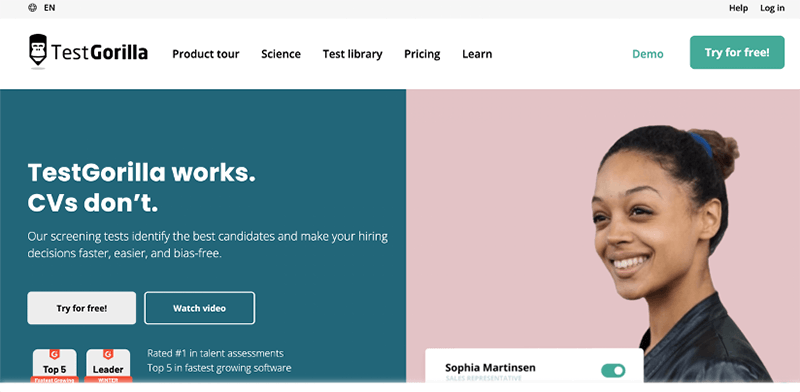
TestGorilla is a user-friendly skills assessment platform that offers a diverse range of tests to evaluate candidates across different domains. It provides customizable assessments, allowing employers to create tests tailored to their specific job requirements. TestGorilla’s assessments cover skills, personality traits, and cognitive abilities, making it a valuable tool for finding the right candidates for various roles. The platform also offers candidate-friendly features like video interviews and coding challenges.
Pros:
User-Friendly: TestGorilla provides a user-friendly interface that is accessible for both employers and candidates.
Diverse Assessment Types: Offers a wide variety of assessment types, including skills tests, personality assessments, and video interviews.
Customizable Assessments: Employers can create custom assessments or choose from pre-built tests.
Cons:
Limited Specialization: While it offers various assessments, TestGorilla may not be as specialized as some alternatives in specific domains, such as coding.
6. Plum
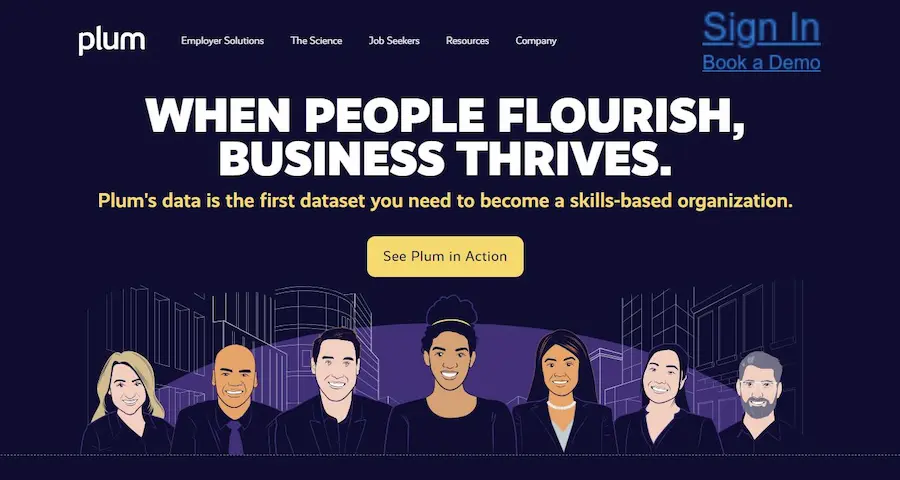
Plum is a talent assessment platform that focuses on evaluating candidates’ potential and fit for specific roles within an organization. It uses data-driven assessments to measure cognitive abilities, personality traits, and other relevant factors. Plum’s platform generates detailed candidate profiles, helping employers match candidates to roles that align with their strengths and potential for growth. It’s a useful tool for organizations looking to make strategic and data-backed hiring decisions based on candidates’ potential and suitability for future roles.
Pros:
Potential Assessment: Plum assesses candidates’ potential and fit for specific roles, aiding in strategic workforce planning.
Data-Driven Insights: Provides data-driven candidate profiles to help match candidates with roles aligned with their strengths.
Cognitive Assessment: Offers cognitive assessments to evaluate problem-solving and critical thinking skills.
Cons:
May Require Integration: For full utilization, Plum may need integration with other HR systems, which can add complexity.
Focused on Future Potential: Plum focuses on potential, which may not be suitable for roles where immediate skills are critical.
Each of these software alternatives offers unique strengths and limitations, making them suitable for different hiring needs and industries. Employers should carefully consider their specific requirements and the nature of the positions they are hiring for when selecting the most appropriate assessment tool.
These alternative software products offer a range of assessment options and cater to various industries and roles, allowing organizations to choose the one that best fits their specific hiring needs.